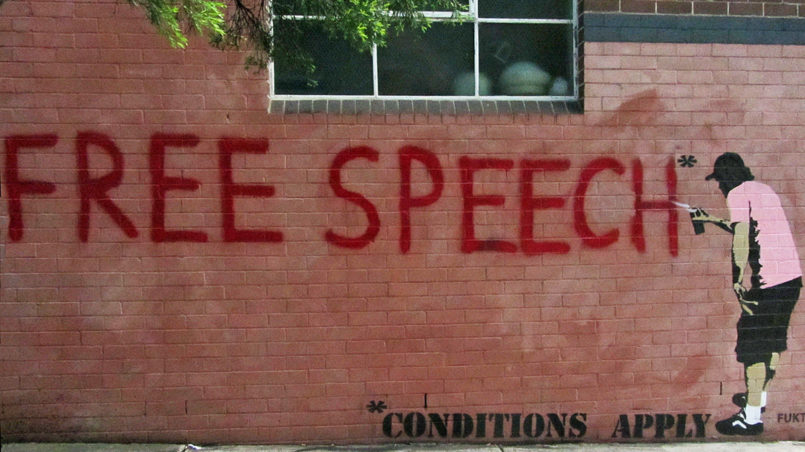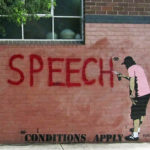Should Freedom of Expression be Absolute?

There is a growing concern in India, the largest democracy in the world, that freedom of expression is under attack and, along with it, values of pluralism and tolerance. Such concern is not unwarranted as one can witness an increasing erosion of creative freedom, attempts to clamp down on the media, growing instances of sedition and defamation cases, hate speech and censorship and many other manifestations of shrinking freedom of expression.
And this state of affairs has led to people in India debating if freedom of expression should be absolute or there should be restrictions on it, as the state opines. There is no doubt that it is a complex issue with no straightforward or easy answer. I would thus like to present the different possibilities when it comes to freedom of expression and its attempted regulation by state authorities.
The notion of freedom of expression can be traced back from the ancient political thoughts of the Greek civilization. In fact, since the seventeenth-century liberal political thinkers have advocated that freedom of expression is the core of their political philosophy.
The guarantee of freedom of expression and information is recognized as a basic human right in the Universal Declaration of Human Rights (UDHR). The UDHR was drafted as the foundation and standard of international human rights law and was adopted by the United Nations in 1948. Article 19 of the Declaration states that:
Everyone has the right to freedom of opinion and expression; this right includes freedom to hold opinions without interference and to seek, receive and impart information and ideas through the media and regardless of frontiers.
Even Article 10 of the European Convention on Human Rights (ECHR) recognizes freedom of expression as a human right. And freedom of expression as a human right includes freedom to hold opinions and to receive and impart information and ideas without interference by public authorities and regardless of frontiers.
However, at times it might seem that the term “freedom of expression” is quite vague and ambiguous. It seems so because all that comes under the ambit of the term ‘freedom of expression’ is quite diverse and broad. This term encompasses freedom of speech and media but also comprises freedom of thought, conscience, cultural expression as well as intellectual inquiry. In fact, freedom of expression guarantees every individual the right to speak and write openly within the domain of a constitution. And such right includes the right to criticize injustices, illegal activities, and incompetence of the government without fear of reprisal.
Freedom of expression also includes the right to inform the public, to offer opinions, and to advocate change, including changing the government, with reasonable restrictions. Besides, freedom of expression is also the right to voice opinions in common. It gives the majority and the minority the chance to be heard and opinions to be shaped with more comprehensive discussions. Most importantly, freedom of expression is the right to challenge any form of state tyranny by force of words and ideas.
Freedom of expression is indubitably one of the fundamental foundations of any democracy. Democracy and freedom of expression are linked in such a manner that freedom of expression is considered to be one of the important pillars of a liberal democracy. In fact, it is opined that freedom of expression is a core freedom without which democracy could not exist. The absence of freedom of expression would turn any democracy into an illiberal democracy where only the procedural aspect of democracy remains.
I believe everyone would love to have absolute freedom when it comes to freedom of speech or expression. However, to me, it seems impractical in many ways. It is important that every individual should have the power and freedom to express his/her opinions or raise his/her voice against the inept state of affairs. But this should not get translated into some kind of misunderstanding that one is free to say anything even if it might lead to the instigation of unrest and disharmony. According to such logic, some kind of reasonable restrictions is necessary to avoid the gradual disintegration of harmony in society. However, it is also valid to argue that once reasonable restrictions are allowed to apply in the case of freedom of expression, the former would start to include many other restrictions.
It is usually the state which exerts and extends their authority over what constitutes reasonable restrictions. Isn’t it problematic to let the state decide what its citizens should express and what they should not express?
It is said that one man’s freedom begins where another’s freedom ends. But is it really possible for the state to put genuinely reasonable restrictions on everyone’s freedom of expression to stop one’s freedom from getting in the way of another’s freedom?
It seems that a self-imposed restriction on the manner of expression while being respectful of other pluralistic sensibilities is a necessity. In fact, judiciously self-regulated expression of opinions or dissent is more desirable than restrictions imposed by state authorities. But is this viable?
Credits
| Image | Title | Author | License |
|---|---|---|---|
 |
6219961958_f51291fba0_o- | Newtown grafitti | CC BY 2.0 |
